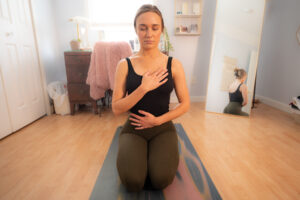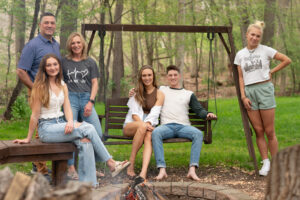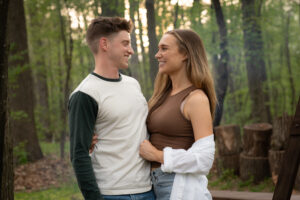Valerie | Living with ARVC
Brighton, Michigan | Born October 1994
If my parents wouldn’t have fought for me, I would be dead. I can never pay them back for that. I’m okay. I have ARVC. I have an ICD, but I’m still me.
Valerie strolls through the woods, winding her way around swamps and streams leading to a small pond. She observes the recent explosion of spring—the triumphant return of green—on her way into town, where she looks forward to a yoga class. “Being in nature in general is so good for me,” she says. “It’s therapeutic to walk out my back door to trails in a state park.”
Discovering the wonders right in her backyard is an iteration of her lifelong love of the outdoors. It is something woven into her family, who enthusiastically explored the vastness of Michigan, their home state. “Valerie was six months old when we took her on her first camping trip,” says Steve, her father. For him, the sensible thing to do for vacation was to pack up their car and head to the woods with a pop-up camper.
At the age of 17, Val, as her family and friends affectionately call her, expanded her horizons outdoors on a trip to Isle Royale. Along with her father and two sisters, Paige and Allie, they traveled to the undeveloped island off the northern coast of Michigan’s Upper Peninsula for a rugged backpacking trip.
“We had done some hiking before,” says Valerie. “But never an overnight where we brought our own packs.” After recovering from the very rough three-and-a-half-hour boat ride, Steve and his three daughters headed out to spend their first of five nights in the woods. “It was awesome to be so far from civilization,” Valerie continues. “No roads, wifi, cell service, electricity. It was mostly untouched nature.”
Although it rained nearly every day which made for some soggy camping, this did little to dissuade the girls from falling in love with backpacking. “What they took away from the experience blew me away,” reflects Steve. He watched his daughters power-through adversity and enjoy the challenge. Upon returning home, it was clear that a change had taken place. In the coming years they planned more backpacking trips together across the eastern US.
As special as the state park near Valerie’s house is, it is but a distant reminder of such times. Serious backpacking and being far from civilization are all dangerous activities, as is any physical activity that would elevate her heart rate. Valerie lives with arrhythmogenic right ventricular cardiomyopathy (ARVC), a rare genetic heart disease that causes potentially deadly arrhythmias. The diagnosis has dramatically reshaped her life, as a young woman who once pushed herself regularly as an athlete and adventurer.
“Some days I don’t know who I am anymore,” Valerie reflects. “Everything I love doing in my life has been put off limits.” Diagnosed three years ago, she has had to greatly reduce her physical activity, or risk going into a dangerous arrhythmia, such as ventricular tachycardia (VT). Going for walks, practicing yoga, and some light weightlifting is not always what she wants to do, but it’s all she can do safely.
The VT caused by ARVC often comes on suddenly and can affect athletes or otherwise healthy people who regularly raise their heart rate. For Valerie, there was little sign that anything was wrong until she was 24 years old. It was then, in early 2019, while driving home from the gym with her then-new boyfriend Logan, that she was overcome by a feeling of lightheadedness. “I said, ‘I’m going to pass out. I have like five seconds.’” She quickly pulled the car over and took deep breaths, hoping the feeling would pass.
After only a few minutes Valerie felt better, but she knew something was wrong with her heart. Currently, in the midst of studying for her nursing board exams, she understood the potential seriousness of the incident and made an appointment with a cardiologist.
In the meantime, Valerie passed her boards and landed her first job as a nurse in a hospital in Detroit. Before it began, she decided to take a quick trip with Allie and their mother, Jeannette, to Ft. Lauderdale for some beach time.
On May 9, 2019, the final night of their vacation, Allie and Valerie were dancing together at a bar down the street while Jeannette rested at the hotel room. As the two sisters danced and laughed, Valerie started to stumble into the rope at the edge of the dance floor. “Literally the last thing I remember was saying to Allie, ‘I don’t’ feel well.’ And then I felt nothing.” Allie watched as her sister fell, flipping over the rope and hitting the concrete floor.
Valerie lay unresponsive. Allie glanced around at the rest of the bar. People hardly took notice of her fall, most figuring she was just drunk. “I started to panic when I saw her eyes rolled back in her head,” remembers Allie. She started screaming for help—for someone to call 911. Finally, a man at the bar ran over and took Valerie’s pulse. She didn’t have one.
Back at the hotel, Jeannette’s phone rang. It was Allie, hysterical. Jeannette threw on her shoes and sprinted to the bar. When she arrived, she saw the lights of the ambulance, and inside Valerie with a team of paramedics.
“I got a rhythm!” a responder announced, breathing hard.
Jeannette couldn’t believe her ears. In an instant, the career nurse had a good understanding of the gravity of the situation at hand, although no idea what had happened. Valerie was fine as could be 30 minutes ago, and now she literally lay on death’s door.
Jeannette stepped into the firetruck to find Allie sobbing. “We have to pray mom. We have to pray,” she repeated. They followed the ambulance to the hospital and doctors began investigating what had happened. Eventually, a doctor delivered the news to Allie and Jeannette, with Steve, back in Michigan, on speakerphone.
“He told us Valerie had a full cardiac arrest,” recalls Jeannette. She was in a medically-induced coma. “They had to prepare us for the worst. She may never wake up.”
Furthermore, the doctors were worried about damage to her brain and vital organs. Valerie had suffered a sudden cardiac arrest (SCA) and her heart did not start again for a full 30 minutes. Even after the heroics of the paramedics, to not have oxygen going to the brain for that long—most doctors agreed—was catastrophic, and beyond the point of return.

Faith plays an important role in Valerie’s family, and the circumstances of her SCA would require no small amount of it. Steve and Paige arrived the next day, as did Logan. “I don’t think there was any question that I was going to go down there,” Logan recalls. “I knew I wasn’t coming home until she was able to as well.” Together, they took shifts watching over Valerie, day and night as she lay in a medically-induced coma, set on to try and limit the damage to her brain and organs. Her parents opted to keep her in the hypothermic coma, holding out hope that daughter would return them as they remembered her. It might be asking for a miracle, but they looked to each other, friends, and scripture to guide them through.
A couple nights later, Valerie again went into cardiac arrest. Nurses and doctors shocked her heart back into rhythm several times. This recurring arrhythmic event was all the cajoling doctors would need to go ahead and implant an ICD in Valerie’s chest to protect her against whatever was causing her SCAs.
At the end of the third day, Valerie’s condition stabilized, and doctors started to release her from the sedation she was under. They brought her body back to normal temperature. Her nurse squeezed her hands and as she spoke, Valerie’s eyes began to twitch—the first sign that she was coming back.
Jeannette bent down and looked at her daughter, bulging with tubes and surrounded by medical equipment. “Val, it’s mom.” She spoke courageously. “If you can hear me, nod your head.” The slow bobbing of Valerie’s chin was met with joy. “The first time she looked at me in the eye,” says Allie, “it was a light in the room and a breath of fresh air.”
“By far the worst experience of my life was coming off of sedation,” says Valerie. “It was a nightmare in real life.” For the next week, she would go through wretched withdrawals, as the sedatives left her body. She didn’t sleep for three days and had cryptic, frightening visions of distorted realities. Valerie did not know where she was or who was around her much of the time. In moments of clear-headedness, she would awake to find herself encumbered by tubes and wires. She would struggle to free herself, becoming combative with staff and family members.
Valerie has always been a very determined if not outwardly stubborn person, and these traits became more and more obvious to her family and to Logan, who stayed by his girlfriend’s side practically 24/7 for the three weeks she was in the hospital.
Her persistence was the first clue to the progress that she was making—that in the end, she would return with full neurological capacity. In a matter of a week, Valerie went from barely being able to make a fist to walking herself to the bathroom. “We couldn’t slow her down,” remembers Steve, who had made a futile attempt to try and stop her the first time she got out of bed on her own.
Valerie’s recovery from her SCA shocked many of the physicians at the hospital. “I think she taught them a very important lesson,” reflects Jeannette. Her doctors and therapists sobbed when they saw her, unable to comprehend how someone with slim to no odds made a full recovery.
To this day, Valerie struggles to make sense out of it all. “If my parents wouldn’t have fought for me, I would be dead.” Valerie incurs a flurry of tears. “I can never pay them back for that. I’m okay. I have ARVC. I have an ICD, but I’m still me.” After 23 days in the hospital, Valerie with Logan and her family by her side, returned to Michigan.

Valerie changes into her scrubs and gets ready for work. But before leaving, she carefully counts her pills and then takes an array of medications: beta blockers, ACE inhibitors, and antiarrhythmics to try and control her ARVC symptoms and progression.
Valerie currently works at Mott Children’s Hospital in nearby Ann Arbor. She arrives on her floor, the pediatric cardiothoracic unit, and begins making the rounds with her patients. The vast majority are children born with congenital heart defects—many of them require open heart surgery and spend weeks or months under her care before being healthy enough to go home.
Valerie loves her job and attends to her patients with an abundance of care and understanding. “I know what it’s like to be in withdrawal [from sedatives] and I can see it in my patients sometimes. And I will always make sure we are treating them how we should. I know how awful it is.” On occasion, she has opened up more to parents in the ward, relaying her experience with SCA as a way to inject hope into what can feel like hopeless situations. “Just this week, I was talking to this mom. I knew she was having a hard day. I could tell she was struggling. We got talking and I was able to give her some of the advice that I’ve been giving myself for the past three years.”
After leaving the hospital in June 2019, doctors had surmised that Valerie might have ARVC. “I had a lot of major and minor criteria,” says Val. “The genetic testing was the seal on the envelope, just to confirm it.” That September, genetic tests showed a mutation to the PKP2 gene, which is responsible for creating cardiac muscle tissue. It is a prominent mutation associated with ARVC and Valerie was not the only family member to test positive—Steve and Allie did as well.

The hardest transition for Valerie was giving up her various athletic interests—hiking, running, cycling, tennis, and dancing—that had defined her life. The transition has left her in a subtle identity crisis. She transitioned to practicing yoga regularly, something she remains deeply passionate about, and rediscovered old interests, like watercolor painting. “She’s a person, who despite essentially having part of her identity taken away from her, pretty much wakes up every day with her chin up,” says Logan. “I’m more than honored to be with a partner who has an attitude like that. That type of strength is pretty rare.” Valerie continued the process of reorienting herself to a different, more sedentary lifestyle, as tricky as that could be.
“My first ICD shock was a big smack in the face for me,” she says. Valerie was out with friends, dancing in September 2019, when she felt a kick in the chest. “I’ve learned that I can’t go out to bars and dance, although I would like to,” she laments. “That was always something I loved to do.”
Since then, Valerie has further curtailed her physical activity, but continued to suffer from VT, even from “safe” activities. She and Logan got engaged in September of 2021, and during an engagement photo session, she received another shock. “Things started going downhill really quick after that,” she says. Over the coming months Valerie would suffer more arrhythmias and a dramatic increase in her premature ventricular contractions (PVCs), or extra beats of her heart that disrupt its rhythm. These were exacerbated by any minor indulgence, such as drinking alcohol, or eating pizza, her favorite food.
“I was just having so much VT and being paced out of it,” Valerie recalls from this past winter. Her ICD was working overtime, and the records of all the instances that it “paced” her, or corrected her heart’s rhythms went to her medical team. They pushed her up to the maximum dose of Sotalol, an antiarrhythmic, and recommended that she get an ablation, a surgical procedure that uses heat or cold to destroy scar tissue on her cardiac muscle.
“I’m very excited to have the ablation,” Valerie espouses. “I’m ready to get my life back a little bit.” In June of 2022, she got the procedure, which has at least temporarily relieved some of the daily bouts of VT that Valerie struggled with.

Later in the evening, Valerie heads over to her parents’ house for dinner and a backyard campfire. As she arrives, Steve is already getting a pile of kindling going in the fire pit. Paige and Allie meet their sister on the back porch and catch up on their week. Valerie processes out loud with them about how challenging managing her health can be.
“My sisters have developed this strange, innate intuition about knowing when I’m going through things,” she shares. “They’ve been so good. Encouraging me. Every little episode I have—they reach out and text me about how strong I really am.”
Allie and Valerie share a particular bond, having ARVC. Allie was diagnosed soon after Valerie, after her freshman year of college where she played Division 1 lacrosse, something she had a love-hate relationship with. With her ARVC diagnosis, there was no choice to make. She was forced to quit the team, got an ICD implanted in October of 2020, and since then has continued to be symptom-free.
“With Allie, we have to watch her,” remarks Jeanette, alluding to the various unknowns. “We caught her ARVC early. If she had continued with her high-level activity in lacrosse it would have caught up with her. Valerie to this day, believes that what happened to her was to make this known in our family and save her sister’s life.”
Steve, who also tested positive for the PKP2 gene has never shown any symptoms of ARVC, despite being an avid runner and hiker, adding another level of mystery to the events that have transpired. “I’ve enrolled in a study to try and learn why I have this layer of protection that they don’t have,” he shares. Steve and the rest of the family remain abreast of developments in research that have the possibility to affect the outcomes for people living with ARVC, specifically gene therapy. “It would be amazing,” says Steve. “Not just for those two, but everyone with this disease… Allow them to do the things they want to do again.”
Valerie has a lot of hope in a better treatment coming. “All this suffering that many go through could potentially go away. I might not need a transplant in 10 years. I might not have heart failure when I’m 40. I just won’t worry. It won’t be a thought. To know that is nothing short of a miracle.”
Soon, Logan arrives after his shift. With his usual laid-back demeanor, he blends in comfortably with the rest of Valerie’s family. “I am so grateful for Logan and that he was brought into my life at what seems like bad timing for him, but really good timing for me,” says Valerie. Through the troubles of the last few years, their bond has only grown stronger, and he has proven himself consistent, caring, and solid. After her cardiac arrest, he got involved with the local fire department, where he works as an EMT, something he was inspired to do by the crew that helped save Valerie’s life. Looking forward, the two have a lot of planning to do for their wedding, coming September 2021, laying the celebratory groundwork for their future ahead.
“I want to focus on the things that are most important to me: my future husband, my friends, and my family,” says Valerie, an air of defiance blending in with her exhaustion from dealing with this disease. She does not want the daily battles of living with ARVC to define her time on earth. “I get to spend so much time celebrating this year. I have so much to look forward to.”

